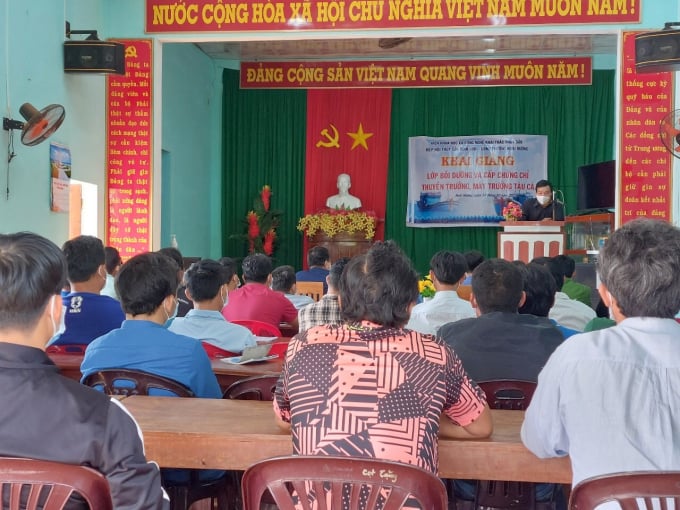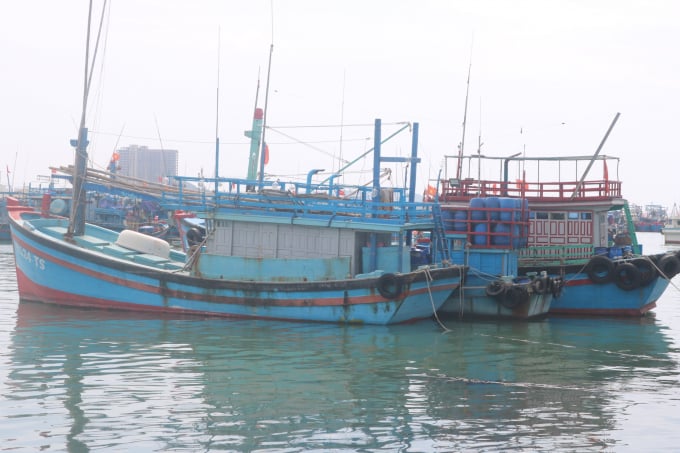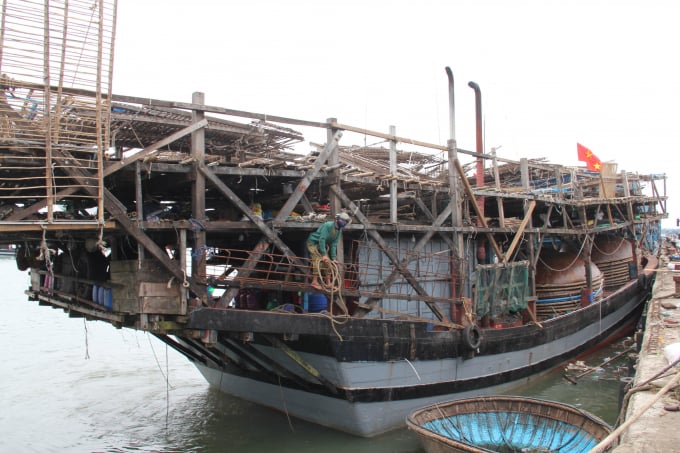May 28, 2025 | 11:16 GMT +7
May 28, 2025 | 11:16 GMT +7
Hotline: 0913.378.918
May 28, 2025 | 11:16 GMT +7
Hotline: 0913.378.918
Việt Nam’s fisheries sector is still facing many problems – the fishing activities are mostly conducted by the fishing households, the fishing vessels are small, fishing equipment and methods are traditional and outdated.
Therefore, the training, fostering and granting practice certificates to local fishermen is of crucial importance to improve fishing capacity.

Binh Dinh Province has opening many traning classes to local captains and mechanics. Photo: V.D.T.
In recent years, the coastal localities of the South Central Coast have focused on training and granting certificates to fishermen, gradually helping them to access modern fisheries and transferring from traditional approaches to sustainably developed fisheries.
Particularly, Binh Dinh Province has 5,951 fishing vessels, of which there are about 3,200 offshore ones. To meet the requirements of crew titles, fishing vessels in Binh Dinh will need a total of 13,523 captains, chief engineers of all classes and mechanics.
However, in previous years, the total number of captains, chief engineers and mechanics who attended training classes was only 4,474 people, which is a "gap" that the Binh Dinh authorities have made efforts to fix in recent years.
According to Nguyen Cong Binh, Deputy Director of Binh Dinh Fisheries Sub-Department, the province has determined that training, fostering and granting vocational certificates for fishermen is one of the important things to effectively support fishermen’s activities at sea.

In recent years, fishing boat crews in Khanh Hoa Province have been trained by specialized agencies to significantly improve their fishing skills. Photo: K.S.
Implementing Circular No. 22 of the Ministry of Agriculture and Rural Development, Binh Dinh Department of Agriculture and Rural Development has directed the Sub-Department of Fisheries to coordinate with the Binh Dinh Fisheries Association and the Institute of Science and Technology for Fisheries to organize training classes to local fishermen. Up to now, most fishing vessels in the province have been fully certified according to regulations.
In Quang Nam Province, 2-3 training classes to improve the fishing skills as well as the capacity of captains and chief engineers are opened yearly, depending on the needs of each locality.
However, the exploitation activities at sea normally last from two to four months, which also impose an obstacle in opening training classes.
Currently, Quang Nam Province will take the seasons when fishermen stop fishing into account to open the training classes. This requires the arrangement of the fishermen and training units on the appropriate time to organize classes.

The offshore fishing activities of Quang Nam fishermen usually last from 2-4 months, also imposing an obstacle in opening training classes in the province. Photo: L.K.
“The training of captains of grades 3, 4, and 5 requires that they have had certain qualifications. If they lack a cultural foundation, it is impossible to provide intensive training and meet the needs of the fisheries sector,” said Tran Quang Kien, Chairman of the Quang Nam Fisheries Association.
Meanwhile, to improve the level of fishing, the Sub-Department of Fisheries of Phu Yen Province has cooperated with units and enterprises to instruct and support fishermen to access modern equipment, while providing basic knowledge in exploitation, especially for offshore fishing fleets, over the past few years.
In addition, the coordination in organizing training for captains and chief engineers has met the practical requirements in terms of quantity required by regulations.
“In recent years, fishing vessel operators in Khanh Hoa Province have been trained by specialized agencies to significantly improve their fishing skills. Most of the crew have known how to operate the machinery and equipment on the vessels such as locator or fish detector”, said Nguyen Van Lau, Chairman of Vinh Phuoc Fisheries Union in Nha Trang City, Khanh Hoa Province.
According to the Directorate of Fisheries under the Ministry of Agriculture and Rural Development, the country now has 86 fishery unions in 16 out of 28 coastal provinces and cities, with nearly 17,700 members and over 6,200 fishing ships of 15m in length and above.
Regarding preservation work, there are 354 ice production facilities, 640 cold storages with a total capacity of 78,700 tonnes, and nine establishments that can classify 240 tonnes of products per day.
The directorate reported that Vietnam’s total seafood output has reached 566,700 tonnes in the first three months of 2022, up 0.1 percent year-on-year.
Localities nationwide have been urged to focus on restructuring fishing fleets and their fisheries, managing and tracing origin of products, monitoring fishing boats, and building plans on protecting and restoring aquatic resources.
Translated by Phuong Ha

(VAN) FAO’s Director-General addresses the 5th Baghdad International Water Conference.
/2025/05/26/1716-4-nongnghiep-191706.jpg)
(VAN) Chain linkages, technological innovation, and raw material zoning are three strategic pillars for the coconut industry to strongly develop and elevate its position on the global agricultural map.
![Advanced mariculture – an inevitable trend: [4] Accompanied by scientists](https://t.ex-cdn.com/nongnghiepmoitruong.vn/608w/files/sohk/2025/05/13/1941-pgsts-vo-van-nha-140958_717.jpg)
(VAN) According to Assoc. Prof. Dr. Vo Van Nha, Director of the RIA III, the development of advanced offshore mariculture is no longer an option but an essential path for Vietnam’s fisheries sector.

(VAN) Vietnam is intensifying the development of mollusk farming areas that meet international standards, aiming for sustainable growth and enhancing its export position in the global seafood market.
![Advanced mariculture – an inevitable trend: [3] Policy-driven momentum](https://t.ex-cdn.com/nongnghiepmoitruong.vn/608w/files/doanhtq/2025/05/21/0104-0616-0348-nuoi-bien-170339_789.jpg)
(VAN) To ensure the success of offshore mariculture that uses advanced technologies, it is essential to establish supportive policies that inspire both individuals and enterprises to invest with confidence.
![Advanced mariculture – an inevitable trend: [2] Outstanding results](https://t.ex-cdn.com/nongnghiepmoitruong.vn/608w/files/sohk/2025/05/12/4632-4136-nuoi-bien-11-164117_819.jpg)
(VAN) Pilot models of high-tech offshore mariculture in Vietnam, particularly in the South Central Coast region, have demonstrated exceptional economic returns and sustainability, setting a new direction for the country’s aquaculture industry.
![Advanced mariculture – an inevitable trend: [1] Moving offshore](https://t.ex-cdn.com/nongnghiepmoitruong.vn/608w/files/phucpm/2025/05/18/0252-2436-nuoi-bien-6-162148_783.jpg)
(VAN) Mariculture using advanced technology and moving offshore is an inevitable trend, as nearshore areas increasingly reveal limitations.